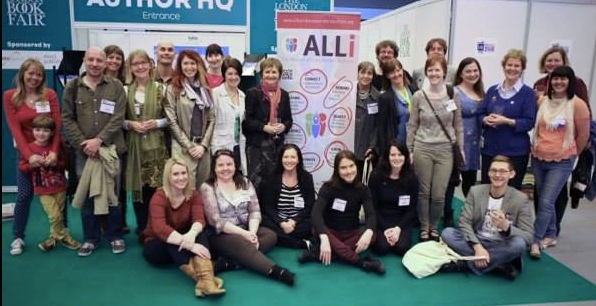 ALLI authors meet up at the London Book Fair April 2014 Writing is a solitary thing – it’s you, the writing medium and hard graft alone together. Your imagination/brain/mind/muse and the pen or keyboard are it. Perhaps you have a writing buddy, known sometimes as a critique partner, or belong to a writers’ circle or a writers’ association, but if you’re an independently published author, you have another layer of questions to ask and topics to discuss.
 I’ve found two groups for independent authors which I would recommend: both are friendly, open and collaborative. The Alliance of Independent Authors (ALLI) fosters the independent sector as a valuable, fruitful and contributing part of the publishing industry, but above all, it is driven by and for its authors – ‘connection and collaboration, advice and education,’. A blog about trends, successes, writing craft and marketing go hand in hand with member support and industry campaigns such as ‘Open Up To Indies‘. I’ve never regretted a penny of my £75 annual membership fee! And you get a great badge… I’ve found two groups for independent authors which I would recommend: both are friendly, open and collaborative. The Alliance of Independent Authors (ALLI) fosters the independent sector as a valuable, fruitful and contributing part of the publishing industry, but above all, it is driven by and for its authors – ‘connection and collaboration, advice and education,’. A blog about trends, successes, writing craft and marketing go hand in hand with member support and industry campaigns such as ‘Open Up To Indies‘. I’ve never regretted a penny of my £75 annual membership fee! And you get a great badge…
 As a self-publisher you are totally in control of publishing your books, but you don’t have the backing of a publishing house or their marketing and publicity services. Before somebody else says it, I know that all authors have to market themselves, however they are published, but indies have to be a tad more energetic about it. And they need to collaborate. Awesome Indies operates a quality control system for fiction – have a stroll through its website – but its director, Tahlia Newland, is very pro-active on marketing. If readers don’t know about a book, how can they buy and read it? As a self-publisher you are totally in control of publishing your books, but you don’t have the backing of a publishing house or their marketing and publicity services. Before somebody else says it, I know that all authors have to market themselves, however they are published, but indies have to be a tad more energetic about it. And they need to collaborate. Awesome Indies operates a quality control system for fiction – have a stroll through its website – but its director, Tahlia Newland, is very pro-active on marketing. If readers don’t know about a book, how can they buy and read it?
Recently, they interviewed some of their authors and posted the results on You Tube in a theme-based series of two-minute videos – start here. (I appear in most of them!)
 And, of course, the fabulous Indie B.R.A.G. which is primarily a quality vetting organisation for self-published books, but one which runs a splendid blog for authors, readers and anybody with an interest in self-publishing. This brilliant post on how to support authors is typical of their generous spirit. And, of course, the fabulous Indie B.R.A.G. which is primarily a quality vetting organisation for self-published books, but one which runs a splendid blog for authors, readers and anybody with an interest in self-publishing. This brilliant post on how to support authors is typical of their generous spirit.
My experience is that these international sites complement each other; I’ve met new friends, new colleagues and garnered some pretty savvy advice.
Alison Morton is the author of Roma Nova thrillers, INCEPTIO, and PERFIDITAS. Third in series, SUCCESSIO, is now out.
Find out about Roma Nova news, writing tips and info by signing up for my free monthly email newsletter.
If you enjoyed this post, do share it with your friends!Like this:Like Loading...
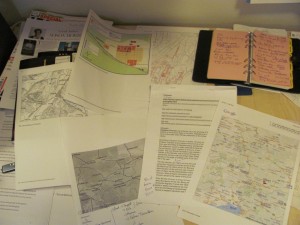 Research. Yeah, I know, a sticky subject in more ways than one. Writing of any sort needs research whether it’s a modern shoes-and-shopping story, crime thriller or a historical magnum opus. Research. Yeah, I know, a sticky subject in more ways than one. Writing of any sort needs research whether it’s a modern shoes-and-shopping story, crime thriller or a historical magnum opus.
Almost every story written hinges on a set-up or a problem the writer has purposefully created, but it must be plausible. Readers will engage with it and follow as long as the writer keeps their attention and, most importantly, their trust. So your story has to look and feel real (even the elves...).
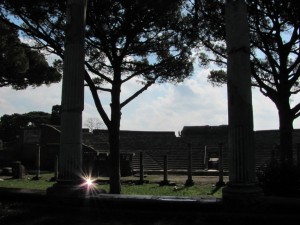 Strongly coupled with this is internal consistency, essential in any science fiction, fantasy or historical setting. Readers want to step out of reality for a few hours; investing their precious reading time in a rather strange place is high-risk for them. So build your world carefully and thoroughly or your credibility will crumble. Strongly coupled with this is internal consistency, essential in any science fiction, fantasy or historical setting. Readers want to step out of reality for a few hours; investing their precious reading time in a rather strange place is high-risk for them. So build your world carefully and thoroughly or your credibility will crumble.
Leaving aside the cracking story you’ve dreamed up or that tale from history you want to tell, what about the setting? It has to be woven into the story or there’s no point in using that background. So you have to know the scenery, weather, what the inhabitants and look like, their clothes, whether they accept strangers, what do they believe in, do they use buses, trains, horses, or just plod everywhere on foot? Can they vote and/or are they subject to a lord or lady’s whim?
I have a list of questions that I print out with space in-between each one. I then sit down and write a paragraph on each. This seems to go into my head better than if I type it on the keyboard.
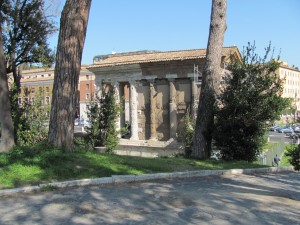 Temple of Portunus – In the Forum Boarium, site of ancient Roman cattle market Even though I write alternative history stories about Roma Nova, an imaginary country, and the first three are set in the present, I need to do research, especially if I’m dipping back into Roma Nova’s past before it diverged from the standard timeline. And if I’m researching modern surveillance equipment or sniper rifles, I need to check the specifications very carefully as they may be vital to the plot development.
I read around the setting(s), both good fiction and straightforward reference material. I’ll exclude everything else ruthlessly. I’m heard muttering in corners about Roman marriage customs, spotted looking up railway schedules or crop harvest times, how many days it took in ancient times to travel from Portus Itius/Gesoriacum (Boulogne) to Rome. Damn. Has Gesoriacum changed its name to Bononia by the 4th century? Maps of archaeological digs and airline timetables start littering my desk along with reference books on childhood illness and police procedure. My colour-coded Filofax pages fill up. Bookmarked articles gather in wobbly formation on my computer desktop…
 So where do you stop? Outside factors decide it sometimes – a publisher deadline, competition date, your own publishing schedule. But for me, a moment arrives when I have finished the first run-through of all my research notes and I’m ‘in the zone’. I’m ready to plunge into the writing. So where do you stop? Outside factors decide it sometimes – a publisher deadline, competition date, your own publishing schedule. But for me, a moment arrives when I have finished the first run-through of all my research notes and I’m ‘in the zone’. I’m ready to plunge into the writing.
When I emerge and re-read write that first draft, I mark up the bits of research I’ve allowed to make an appearance in the manuscript. Much of what I collected in my early research notes has gone into my mental and digital archive and will stay there.
Then I check everything again. I nearly had somebody sail from Rutupiae (Richborough) in the second half of 4th century. By then, Portus Dubris (Dover) was much more prominent as both a civilian and military port, even that late in the Roman occupation of Britain.
So my modus operandi (or M.O. for crime types) can be summed up in three points –
1. do your broad research;
2. write your story;
3. double check everything.
Happy writing!
Alison Morton is the author of Roma Nova thrillers, INCEPTIO, and PERFIDITAS. Third in series, SUCCESSIO, is now out.
Find out about Roma Nova news, writing tips and info by signing up for my free monthly email newsletter.
If you enjoyed this post, do share it with your friends!Like this:Like Loading...
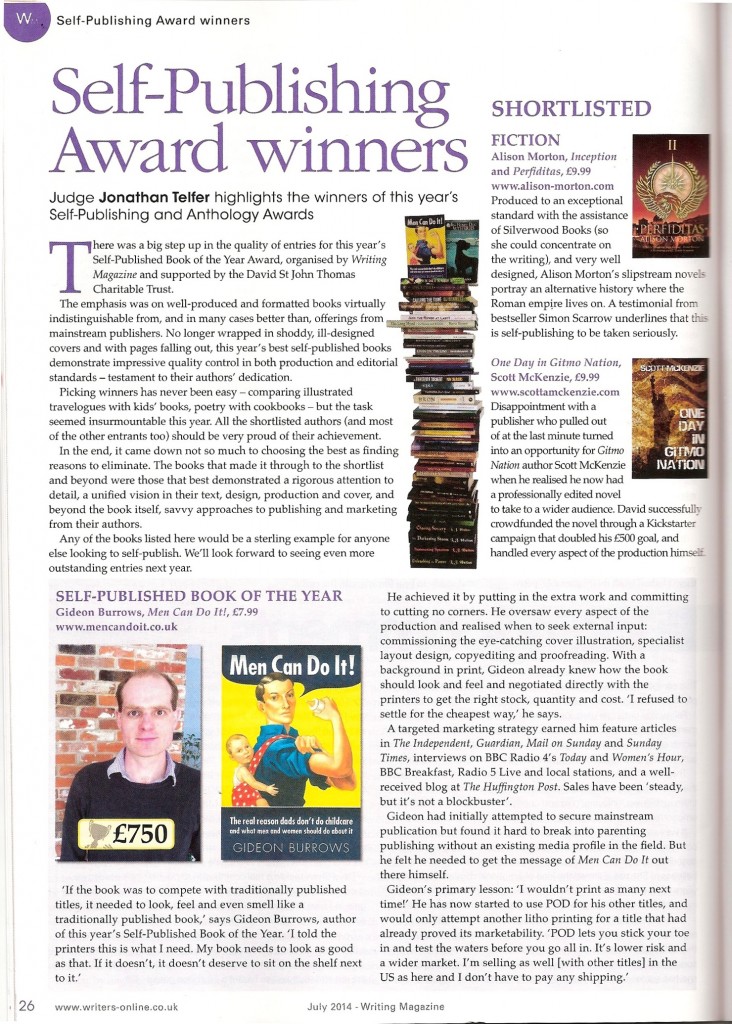 Several months ago, I entered INCEPTIO and PERFIDITAS for the Writing Magazine self-published book award. With all the work finalising SUCCESSIO, I almost forgot about it. Imagine my pleasure when I came home after the SUCCESSIO launch trip, browsed the July issue of Writing Magazine and found that both books had been shortlisted for the award. Several months ago, I entered INCEPTIO and PERFIDITAS for the Writing Magazine self-published book award. With all the work finalising SUCCESSIO, I almost forgot about it. Imagine my pleasure when I came home after the SUCCESSIO launch trip, browsed the July issue of Writing Magazine and found that both books had been shortlisted for the award.
Of course, it would have been fantastic to have won, but having INCEPTIO and PERFIDITAS as two of the remaining four fiction shortlists was wonderful.
And this is what Writing Magazine said…
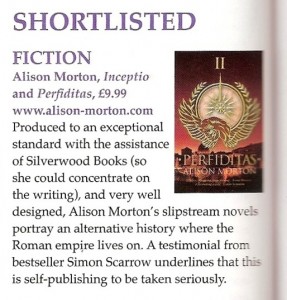 Extract courtesy of Writing Magazine, July 2014
Well, my ego’s been nicely massaged!
Find out about Roma Nova news, writing tips and info by signing up for my free monthly email newsletter.
Alison Morton is the author of Roma Nova thrillers, INCEPTIO, and PERFIDITAS. Third in series, SUCCESSIO, is out now.
If you enjoyed this post, do share it with your friends!Like this:Like Loading...
 I’ve been tagged by historical fiction author Antoine Vanner in a game of Lucky Sevens. I’ve been tagged by historical fiction author Antoine Vanner in a game of Lucky Sevens.
It’s a bit of online fun for writers that pulls us out of our sheds where we sit scribbling away for hours on end and lets us reveal a little our our current work in progress.
Here is how it’s done:
Go to page 7 or 77 in your current manuscript
Go to line 7
Post on your blog the next 7 lines or sentences – as they are!!
Tag 7 other people to do the same
Now, a lot of people have already done this, so I’m not tagging, but I’m inviting any writers who read this to dare to do the same. 😉 Just let me know if you do and I’ll add your name to this post (free advert!)
So here are seven lines from AURELIA, based in Roma Nova and the Germanic Federation state of Prussia. It’s set in the 1960/70s.
‘Himmel! Is that what was transmitting? It’s tiny.’ He stretched his hand out, an acquisitive look in his eyes. ‘I’ll have to take it as evidence.’
‘No. It’s imperial state property. You have your recording.’
He bent his fingers, beckoning impatiently.
‘Sorry, no.’ I glanced up at him. ‘Anyway,’ I said, trying not to sound smug, ‘you don’t have the hardware to transcribe it.’
For all their famous technologic expertise, the Prussians weren’t a patch on us. We kept our secrets to ourselves. As a tiny country, we had to use every advantage and our technology was one of the most important. Even more than the silver.
I’m finding it quite hard to get into the 1960s/70s era. It’s part of my early life and I’ve forgotten most of it! So, back to research..
STOP PRESS: Two writers have stepped forward to take up the Lucky Sevens challenge – and what fascinating replies they are…
Linda Chamberlain http://nakedhorse.wordpress.com/2014/06/29/some-history-instead-of-horses/
Carol Cooper http://pillsandpillowtalk.com/2014/07/05/the-not-so-secret-game-of-sevens/
Alison Morton is the author of Roma Nova thrillers, INCEPTIO, and PERFIDITAS. Third in series, SUCCESSIO, is out now.
If you enjoyed this post, do share it with your friends!Like this:Like Loading...
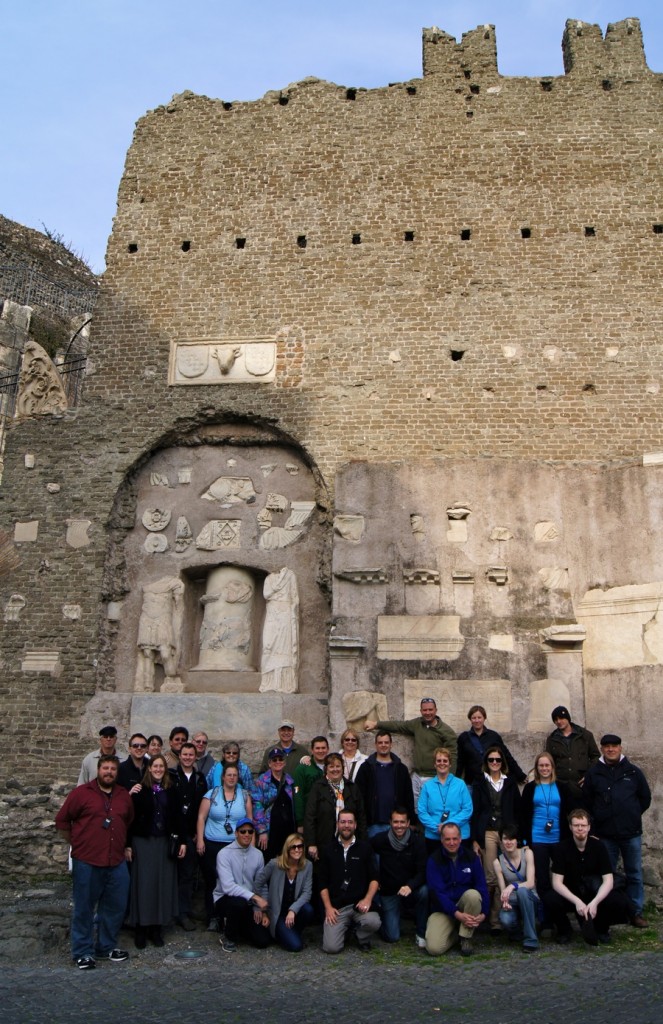 My Roman trip! A ‘holiday’ today means is a specific trip or journey, usually for the purpose of recreation or tourism. But the concept of taking a vacation is a recent invention, and has developed through the last two centuries. Historically, the idea of travel for recreation was a luxury only wealthy people could afford.
Ancient Romans travelled in their ordinary lives – a lot – as did their goods. Soldiers of all ranks were posted to frontiers of Empire; traders traded on sea, in desert cities, on rivers and across land; civil servants on the cursus honorum professional path to fame and riches (they hoped) went off to Baetica, Illyria, Britannia, Noricum or Antioch on government jobs; rich young men were sent to Athens to complete their education. Roman women often travelled with their husbands and fathers when the latter were posted abroad, which could be for years at a time, although many did stay in Rome.
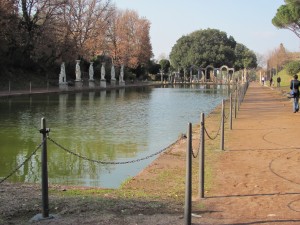 Hadrian’s villa garden. Canopus, designed to recall the Canopus canal, an arm of the Nile River between Alexandria and Abukir. In summer, the Roman elite would take to the hills e.g. Hadrian’s villa at Tivoli, or the Bay of Neapolis. Many went to their estate or farm in the countryside to escape the heat, smells and disease of Rome in the summer. The poor and slaves didn’t have the option unless their employer or master took them along.
But glimmerings of an early tourist trade appeared when Augustus had rid the Mediterranean of pirates, highways were relatively safe for travel, and inns and guides could be found throughout the ancient world’s wonders. Result? Exploration of Italy, Greece, Asia Minor and Egypt became possible for the first time.
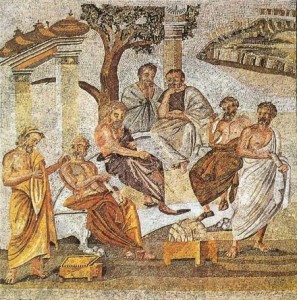 Plato’s Academy (Pompeii mosaic) Wealthier members of society who were educated and sophisticated could travel in groups to visit the great wonders of history and myths they’d read about all their lives. Greece was the favourite destination, particularly Athens where Socrates lived and Plato debated; the Parthenon on the Acropolis was compulsory! And who didn’t want to hear what the oracle at Delphi has to say about your future life?
Asia Minor (roughly modern Turkey) was one of the wealthiest provinces in the empire – all the great spas were there.
But the main attraction was a visit the ruins of Troy (Illium). Quite how genuine an experience it was is questionable. No doubt there were rip-off merchants selling Achilles’ shield, showing them Hector’s sword or pointing out the graves of the various heroes. (Yeah, right)
And no trip was complete without a visit to the pyramids in that exotic and louche country, Egypt, the bridge between Europe, Africa and Asia. And our travellers would bring back souvenirs: statues, fabrics, scrolls of poetry and the odd unmentionable disease. These ‘holidays’ could take up to two years, if you threw in a visit to Petra and Palmyra. A possible parallel is the Grand Tour undertaken by young aristocrats in the 18th and 19th centuries.
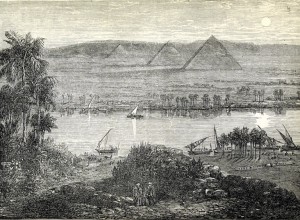 From ‘La terra del Cristo. Viaggio in Oriente’ 1881 But these trips weren’t the rather romantic individual experiences of seeing the wonders of the world in a dreamy and uplifting cloud as the later poets would have us believe. The Romans inhabited a busy, multi-layered and connected world. Going to the Olympic games in Greece was uncomfortable and crowded, and everyone collapsed from heat exhaustion, but they put up with it because it was an amazing spectacle.
And they were used to the noise, bustle and smell of feast/games days back home in Rome.
 Most people’s break from the routine centred on the many feast days celebrating one or other of the gods, the emperor’s birthday, a victory – any excuse, really. During the rule of Claudius, 159 days in the year were designated public holidays, on 93 of which spectacles and games were offered at public expense. Originally, games had religious significance, but under the republic more and more secular games were introduced, some of which lasted as long as a fortnight. Most people’s break from the routine centred on the many feast days celebrating one or other of the gods, the emperor’s birthday, a victory – any excuse, really. During the rule of Claudius, 159 days in the year were designated public holidays, on 93 of which spectacles and games were offered at public expense. Originally, games had religious significance, but under the republic more and more secular games were introduced, some of which lasted as long as a fortnight.
Pretty exhausting all in all. But which is better, going on a holiday overseas with all the excitement, wonder and whiff of danger or on-going days off throughout the year with free public entertainment at home?
Find out about Roma Nova news, writing tips and info by signing up for my free monthly email newsletter.
Alison Morton is the author of Roma Nova thrillers, INCEPTIO, and PERFIDITAS. Third in series, SUCCESSIO, is out now.
If you enjoyed this post, do share it with your friends!Like this:Like Loading...
|
Subscribe to Blog via Email
Join 50 other subscribers.
Categories
Archive
|
 I’ve found two groups for independent authors which I would recommend: both are friendly, open and collaborative. The Alliance of Independent Authors (ALLI) fosters the independent sector as a valuable, fruitful and contributing part of the publishing industry, but above all, it is driven by and for its authors – ‘connection and collaboration, advice and education,’. A blog about trends, successes, writing craft and marketing go hand in hand with member support and industry campaigns such as ‘Open Up To Indies‘. I’ve never regretted a penny of my £75 annual membership fee! And you get a great badge…
I’ve found two groups for independent authors which I would recommend: both are friendly, open and collaborative. The Alliance of Independent Authors (ALLI) fosters the independent sector as a valuable, fruitful and contributing part of the publishing industry, but above all, it is driven by and for its authors – ‘connection and collaboration, advice and education,’. A blog about trends, successes, writing craft and marketing go hand in hand with member support and industry campaigns such as ‘Open Up To Indies‘. I’ve never regretted a penny of my £75 annual membership fee! And you get a great badge… As a self-publisher you are totally in control of publishing your books, but you don’t have the backing of a publishing house or their marketing and publicity services. Before somebody else says it, I know that all authors have to market themselves, however they are published, but indies have to be a tad more energetic about it. And they need to collaborate. Awesome Indies operates a quality control system for fiction – have a stroll through its website – but its director, Tahlia Newland, is very pro-active on marketing. If readers don’t know about a book, how can they buy and read it?
As a self-publisher you are totally in control of publishing your books, but you don’t have the backing of a publishing house or their marketing and publicity services. Before somebody else says it, I know that all authors have to market themselves, however they are published, but indies have to be a tad more energetic about it. And they need to collaborate. Awesome Indies operates a quality control system for fiction – have a stroll through its website – but its director, Tahlia Newland, is very pro-active on marketing. If readers don’t know about a book, how can they buy and read it? And, of course, the fabulous Indie B.R.A.G. which is primarily a quality vetting organisation for self-published books, but one which runs a splendid blog for authors, readers and anybody with an interest in self-publishing. This brilliant post on how to support authors is typical of their generous spirit.
And, of course, the fabulous Indie B.R.A.G. which is primarily a quality vetting organisation for self-published books, but one which runs a splendid blog for authors, readers and anybody with an interest in self-publishing. This brilliant post on how to support authors is typical of their generous spirit.






















